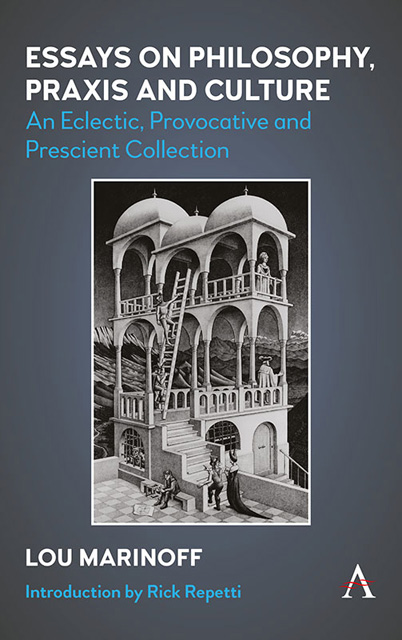Essay #15 - Doing Good and Living Well: Awakening the Inner Philosopher
Published online by Cambridge University Press: 10 January 2023
Summary
This essay was originally read as the Closing Plenary Lecture at the 15th ICPP, in Mexico City, in June 2018.
It was first published in Spanish as Lou Marinoff, “Hacer el Bien et Vivir Bien,” in Prácticas Filosóficas Comparadas, ed. David Sumiacher (Buenos Aires: Novedades Educativas of Argentina, 2019), 43–58.
A Chinese translation was published in Cognitive Science 6.1 (June 2022): 121–141.
This is its first publication in English.
At Home at “The Edge” of Two Worlds: Contemplation and Action
As we celebrate this 15th International Conference on Philosophical Practice, it is clear that we are witnessing the continued growth and development of our movement in many countries around the globe. This success is not only because of the efforts of our communities of practitioners, individually and collectively, year after year; it is also because we provide something that is both useful and beneficial to the public. Throughout history, philosophers have worked either in the realm of pure contemplation or indeed at the intersection of the realms of contemplation and of action. Some philosophers are far more comfortable in the realm of pure contemplation, and their thoughts have provided “fuel” for our engines of action. To assert that we philosophical practitioners work at the edge of contemplation and action is to distinguish us on the one hand from philosophers who contemplate but do not act, and on the other hand from non-philosophers who follow paths of action that may require physical skills or professional expertise but who neither engage in contemplation nor philosophize about their paths of action.
Ruud Meij, of the Netherlands, who organized the 10th ICPP, stated our position rather elegantly, by comparing it with Hermann Hesse’s novel Magister Ludi, also known as The Glass Bead Game. On Meij’s view, we practitioners not only work at the edge of two worlds but, moreover, and unlike those working in one realm or the other, are only “at home at the edge.”
Public Disenchantment with Philosophy as Contemplation Only
Obviously, our movement could not have taken root and branched out in the absence of public demand for our services.
- Type
- Chapter
- Information
- Essays on Philosophy, Praxis and CultureAn Eclectic, Provocative and Prescient Collection, pp. 287 - 304Publisher: Anthem PressPrint publication year: 2022



